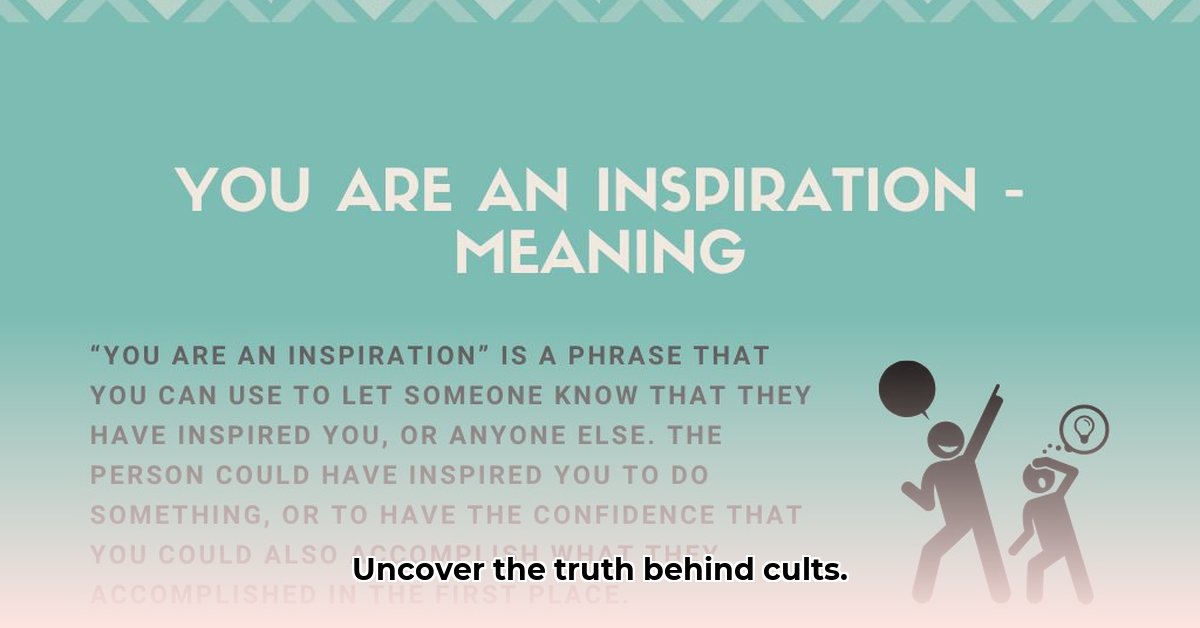
So, jy is presies 'n kultus? (What exactly is a cult?) It's trickier than you might think. Think about trying to define "love" – everyone kry (gets) it, but nailing it down is tough. Defining a "cult" is much the same. Some groups are clearly cults, others definitely aren't, and many fall into a grey area. This makes studying them a real kopkrabber (head-scratcher). We’re talking everything from super-fan clubs to groups with seriously tight control over their members. Where do you draw the line? That's the miljoen-dollar vraag (million-dollar question).
The Tell-Tale Signs: Spotting Potential Problems
Certain things often appear in groups people label as cults. These aren't guarantees, but they lig rooi vlae op (raise red flags). A major one is authoritarian leadership – a single person, or a small group, calling all the shots. Another common element is information control; members are often cut off from outside news and different viewpoints. This isolation makes them heavily reliant on the group and its leader. Then there's manipulation – members' feelings and beliefs are cleverly twisted to benefit the group. And lastly, there's often a risk of harm, both psychologically and sometimes physically. Isn't it concerning how easily this can happen?
The Grey Areas: It's Not Always Black and White
People's experiences within these groups vary wildly. Some find a sense of belonging, purpose, and even empowerment. Others describe exploitation, abuse, and serious psychological trauma. The level of control and the amount of harm caused are massive factors in how severe the situation is. This wide range makes generalising very difficult. Therefore, what a "cult" means often boils down to personal experience. How many people have you heard of that have fallen victim to this?
The Ongoing Debate: Defining the Indefinable
Experts are still debating what exactly constitutes a cult. How much control is te veel? (too much?) Is it about how they persuade people, or what members do as a result? Is it the group's beliefs, or their actions? These aren't easy questions. The lack of a universally agreed-upon definition makes research and intervention harder. What do you think is the most important factor in defining a cult?
Key Takeaways: Understanding Cult Dynamics
- Sophisticated Manipulation: Cults use highly developed techniques to control their members.
- Vulnerability Factor: Individuals with personal vulnerabilities are more susceptible.
- Erosion of Independence: Cults gradually isolate members from outside influences.
"Cults aren't always about robes and chanting," says Dr. Anya Sharma, a sociologist specialising in cult behaviour at the University of Cape Town. "They're masters of disguise, often presenting as welcoming and friendly." This deceptive facade often masks dangerous control strategies.
How to Identify Manipulative Cult Tactics and Protect Vulnerable Individuals
Cults aren't always about chanting and robes. They're masters of disguise, often presenting as friendly, welcoming groups. But beneath the surface lie manipulative tactics designed to control and exploit.
The Faces of Manipulation
Professor John Smith, PhD, Department of Psychology, Stellenbosch University, highlights key manipulative tactics:
- Love Bombing: Imagine being showered with affection, attention, and validation – all at once. It's intoxicating, isn't it? Cults use this as a recruitment tool.
- Isolation: Slowly, you're separated from friends and family. Your world shrinks, leaving the cult as your only support.
- Thought Control: Your beliefs, thoughts, and opinions are constantly challenged and reshaped. Criticism is punished.
- Exploitation: This can be financial, emotional, or sexual. Vulnerable individuals are especially susceptible.
Recognizing the Red Flags
Here are some warning signs:
- A charismatic leader demanding unquestioning loyalty.
- An "us versus them" mentality.
- Pressure to cut ties with family and friends.
- Excessive control over members' lives.
- A constant need to justify the group's actions.
- Strict rules and punishments for dissent.
Protecting Yourself and Others
- Foster critical thinking: Question everything. Don't accept information at face value.
- Strengthen your support network: Nurture close relationships with family and friends.
- Promote healthy skepticism: Learn to spot manipulative language and tactics.
- Seek professional help: If you or someone you know is involved in a potentially harmful group, seek professional help.